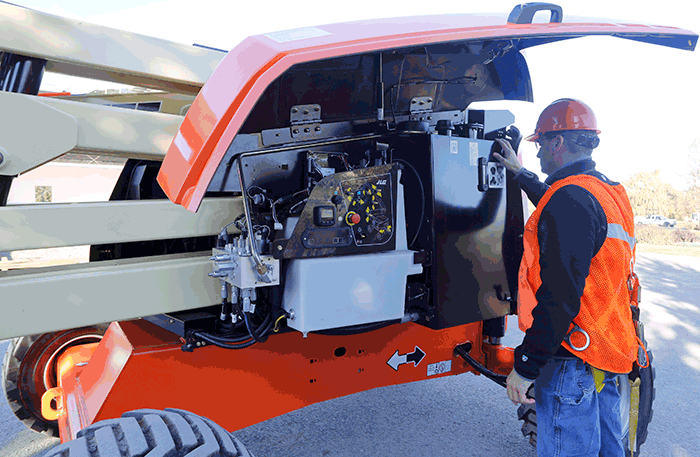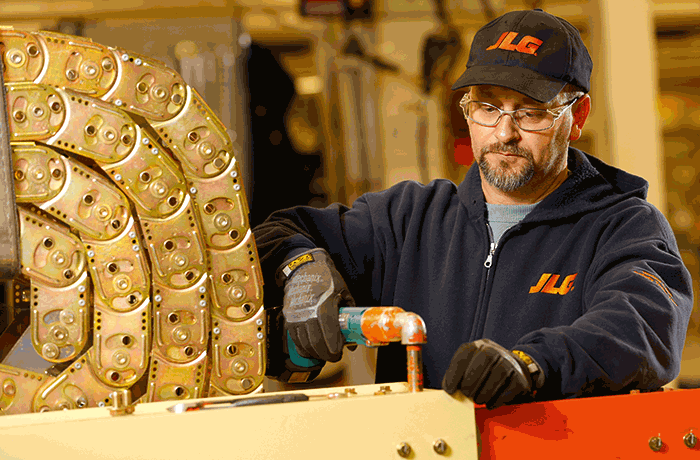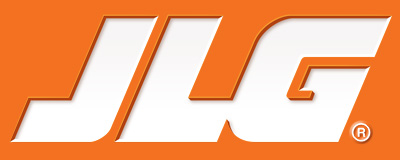Avoiding costly downtime and preserving the service life and resale value of an aerial work platform (AWP) depends, in large part, on following the inspections and maintenance schedules outlined in service manuals provided by equipment manufacturers. But equipment owners and contractors can take additional steps to help ensure longer uptimes and avoid emergency repairs. These steps include making sure the engine is performing properly and efficiently, checking the hydraulic system for signs of contamination and looking for dirt and other materials in machine components.

Check Powertrain Components
Diesel engines require the use of diesel exhaust fluid (DEF), making it important to ensure the right fluid is added and it remains free of contaminants. For example, if screen washer or diesel gas is added to an engine by mistake, damage to the injection, ejection and fluid quality sensing systems can occur. Operating the AWP under these conditions will most likely shorten the life of the machine, making early service intervention key to the efficient, long-term performance of the machine.
Corrosion rather than contaminants threatens the performance of engines powered by battery packs. Preventing corrosion requires regularly cleaning the battery, using a non-metallic brush and a solution of baking soda and water, followed by a clean water rinse. Then, the battery should be thoroughly dried, and the terminals coated with an anti-corrosion compound to prevent further corrosion.
Prevent Contamination of Hydraulic System
In addition to engine performance, equipment owners and contractors should pay close attention to an AWP’s hydraulic system. Contamination is the primary enemy of any hydraulic system. The source of contamination varies—anything from inadequate hydraulic fluid to the introduction of moisture, grease, filings, sealing components or sand often introduced during maintenance. The smallest amount of dirt or foreign material entering the system can cause wear or damage to close-fitting parts, like valves, pumps and motors, resulting in faulty operation and a shortened service life for the AWP.
Evidence of debris in the hydraulic system or cloudy oil indicate the likelihood of a contaminated system. To assess the oil, it is a good idea to remove the filters and inspect them, looking for signs of cloudy oil or metal particles. When contamination is confirmed, the system should be drained, flushed and refilled with clean hydraulic oil.
Keeping hydraulic fluid clean, even before it enters a machine, is important. So is inspecting filters, cleaning them when necessary and replacing them at specified intervals recommended by the equipment manufacturer, or sooner if the machine operates in a harsh environment.

Protect Lines & New Parts
Of course, keeping dirt and other foreign contaminants out of all machine components is important. Manufacturers provide shields, covers, seals, and filters to help keep air, fuel, oil and grease supplies clean. However, the effectiveness of these safeguards depends on regularly scheduled maintenance and taking steps to prevent contamination during maintenance and inspections.
This means coving all openings when air, fuel or oil lines are disconnected during maintenance or service procedures. Any trace of dirt in a line can damage the machine. The same holds true when an AWP is fit for new parts, including oil and air filters. The best advice is to keep all parts inside their containers to limit their exposure to dirt and other foreign materials. This practice also protects the parts against scratching or scoring, which can shorten their service life.
Take a Proactive Approach to AWP Maintenance
Properly maintaining an AWP goes beyond regularly scheduled inspections and service intervals. Proactively managing machine health by cleaning machine components on a regular basis, looking for signs of contamination in the hydraulic system, and making sure the engine is performing as it should can go a long way toward maintaining or even extending the AWP’s service life. It also means longer run times, reduced downtime, fewer costly emergency repairs and service, and, when it’s time to part with a machine, a higher resale value—all because a machine owner takes a proactive approach to maintenance.
To learn about the parts, services and training JLG offers to keep your AWP up and running, visit us here. For additional information about JLG, visit www.jlg.com.



